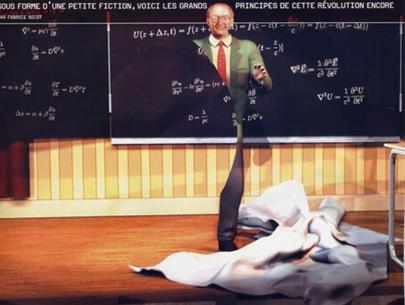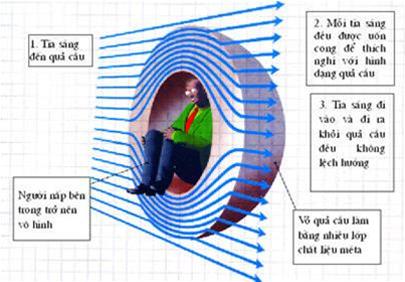Professor John Pendry's stealth machine
In 2018, we are at Imperial College in London, the world press is about to witness the first event on the planet. Soon, Professor John Pendry will present his latest invention.
That attractive object is lying on a wooden platform, covered with a white cloth. All people can describe about it now is . looks like a sphere, about 2 meters in diameter.
Finally, Professor John Pendry also appeared. He slowly approached " it " . and suddenly pulled the cover, revealing a ' machine ' in front of the journalists. All were dumbfounded, surprised. The place that was covered before was . nothing! The applause echoed throughout the room. Professor solemnly declares: This is the first ' stealth machine ' in the world! He tapped on the spot that seemed to be air. It exclaims ' toc ', proving there's something there, really. ' What you don't see is an empty sphere, big enough to hold a person. Get in there he will become invisible '. The whole room was stunned. Then the camera flashed and the questions came to a halt.

After only a decade, this will come true (Photo: TTO)
Of course the show has not yet happened. But that is only a matter of time. Because in theory, Pendry knew what to do: just create an absolutely ' ballless ' sphere with light.
Optical theory of Pendry

Why are we tangible? Of course, it's light. The sun or a light emits light (1). Light travels in a straight line if it encounters an obstacle (like a ball bouncing when it hits a wall) it spreads in all directions (2). When the light reaches the eye of an observer (3), you become visible. On the other hand, for the observer, you have blocked the light emitted behind your back (pine tree in this example) (4).
Since we are ' tangible ' when making obstructions to light, just not reflecting you can be completely invisible. From there, Professor Pendry envisioned a sphere, on which light glided, like river water flowing around a rock.
The light emanating from the sun goes around the sphere (1). The light coming from the pine tree must also go around, then the eye of the observer (2). So he did not see you, who was standing inside the sphere! Because our eyes cannot analyze a curve of light. With observers, the light only goes in a straight line, like through a vacuum, right where the sphere is placed.
Reviewer: but the light can't bend like a lead wire!
John Pendry explains: There is a very clear example of how light is bent. It is a virtual image.
We ride on a hot day. On the road, from afar, a pine tree is reflected in a puddle. But when they arrived, the water and the trees disappeared. The reason is that it never exists . It's a virtual image. There seems to be a glass surface at the base of the pine tree to reflect its image and the blue sky above, creating an illusion like a puddle.
Why is there such a phenomenon? Because the light was bent. This type of illusion occurs when the weather is hot, the temperature of the asphalt pavement is heated by the sun so the air is divided into many layers of temperature, the closer the surface is, the hotter it becomes. Before hitting the surface, the light ray must pass through all of the air layers. Whenever passing through an air layer, it was once refracted, the light was gradually bent when going from one layer of air to another. The higher the air temperature, the greater the degree of bending.
After some refraction, the light is bent to almost parallel with the final layer. But from a certain angle on the air layer, the ray of light rises again (like a rock leaping over the water), the same phenomenon as when it came, but in the opposite direction. When the light reached the observer's eyes, it went an arc. But our eyes only see light traveling in a straight line. This straight line leads down . land! So the image of the head pine tree formed on the asphalt.
Pendry's machine
In the middle is a cavity that allows an object to become invisible. The role of the sphere is to bend the light so that when it comes out it is completely in the same direction as when it comes. Like virtual images, light rays will be bent many times, except for the last time. Therefore, the curvature must be controlled perfectly.
In the case of virtual images, every time the light travels from one layer of air to another, it is bent according to the ambient temperature. Thus we can imagine that the sphere is like a mass of concentric circles. In each layer, the temperature is chosen so that the light is precisely bent, controlling the temperature in the layers will be extremely complex.
Another solution is to use metera-meteramatérial material, invented over 10 years ago, that can bend light rays. How? When light rays pass through, at the molecular level, charged particles appear. Light will be blocked by electrical particles, like magnets, sometimes pushed out at times. The direction of light rays will therefore be changed. Finally, every ray of light will return to the original direction as . never met any obstacle. Thus, the sphere does not appear to become invisible.



CENTRAL
- What is stealth technology? How does it work?
- America shows off a stealthy flagship bearing the nickname 'ghost'
- Successfully making stealth material can make the person behind it disappear!
- Decode the 'invisibility' costume worth half a billion
- Robot is planning to stealth aircraft in the United States
- Chinese and Russian stealth aircraft are still much less American F-35 and F-22
- The older generation of nightmares X-47B
- Materials help fight the shape of the chameleon
- India produces stealth fighter
- China's 'cheap' stealth technology can outmaneuver military radar systems
- Discover the power of Russian stealth fighter T-50
- Try super-drone stealth aircraft
 Daily use inventions come from universities
Daily use inventions come from universities Special weight loss device helps prevent appetite
Special weight loss device helps prevent appetite 8 inventors were killed by their own inventions
8 inventors were killed by their own inventions Iran invented a motor car powered by water
Iran invented a motor car powered by water